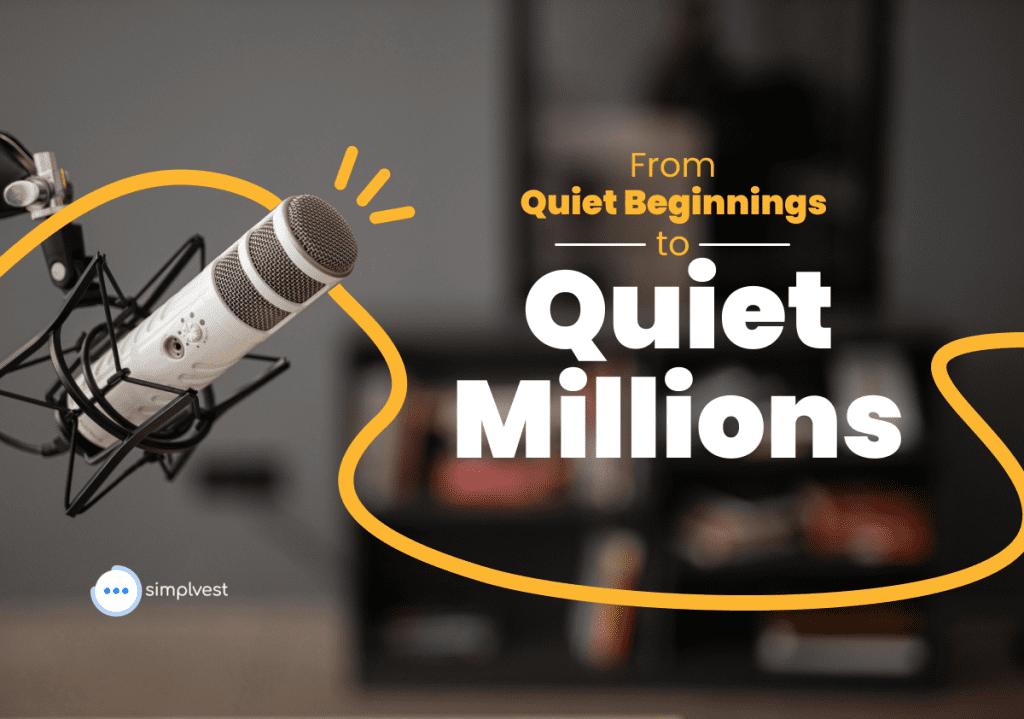Discover how a Nigerian voiceover artist scaled her career to earn six figures, sharing insights on skills, equipment, and strategies for aspiring talent.

When you think of millionaires, you probably picture the founders of big tech startups, stock market wizards, or real estate moguls. But one woman in Nigeria is proving that there’s another way.
After an unexpected start and a relentless commitment to her craft, she built a thriving career in an unconventional industry: voiceover artistry. Now, her overall earnings exceed $100,000, and she’s sharing her insights, tips, and lessons learned along the way.
In this SimplVest Exclusive Q&A, our guest Hannah* talks about her journey from her first humbling gigs to becoming a top voiceover artist, giving practical advice for those curious about entering the industry.
*Not real name
Let’s start at the beginning. How did you get into voiceover work in Nigeria?

Hannah: It was never something I actively pursued. I started off as a corporate consultant, but a friend suggested I try voiceover work for a small project he was involved in. My friends have always maintained that I have a soothing voice, and I used to just take it as “washing”. But I gave it a shot, and it clicked. Before long, I found myself recording for companies and brands in Nigeria and internationally.
What was your first gig like?
Hannah: It was very basic! I think I made less than $50 for it, but it taught me the ropes. At the beginning, my rates were low, and I didn’t have any specialized setup—just my laptop and a makeshift mic. But I quickly realized the potential and started refining my approach.
How did you scale from those first gigs to a six-figure income?
Hannah: Dedication and patience. I know everyone says this, but it really is it. When I started, I set really low prices and took on everything that came my way. My first set-up on Fiverr priced my work at around $20 per gig to attract more clients. At that time, the gig market was fresh, so you could say it was easier to find jobs. I’d often work 12- to 15-hour days, even during weekends, to gain traction and build a steady flow of clients.

Over time, my rates increased as I gained more positive reviews and repeat clients. I eventually started charging around $150 to $200 for each project, depending on the length and complexity. In the past five years, my work has spanned commercials, e-learning modules, audiobooks, and even character voices for gaming projects, which are usually my biggest payouts. In total, I’d say I’ve made about $80,000 to $100,000. Last year was slow, but I earned roughly around $10,000. It’s not always easy, but like I said, persistence and quality work make all the difference.
How do you approach international clients, especially given the competitive nature of the voiceover industry?
Hannah: I have two words for you: clarity and confidence. I focus on clear, neutral diction, but if needed, I can adjust to different accents, particularly American, British, and a bit of French—which actually became one of my more challenging jobs. I once worked with a French client who was incredibly particular about pronunciation and tone. The back-and-forth was intense; we did around five revisions to get the accent just right. In the end, I’m glad I had that opportunity because it taught me a lot about patience and listening carefully to client feedback. And also, the pay was really worth it [lol].
That sounds more like a talent/ gift than a skill, to be honest…
Hannah: Hahaha, I know what that seems like. Indeed, my primary skill was clear English diction, but as I worked with more international clients, I studied the accents I saw were in demand and focused on delivering scripts in a way that was relatable to them. That’s where the skill aspect comes in.
What advice do you have for people looking to get into voiceover work?

Hannah: Start simple. You don’t need an elaborate setup right away—a decent mic and a quiet space will do. My first “studio” was my closet, which was surprisingly effective. Clothes act as great sound buffers. These days, most voiceover artists I know record in closets because it’s easy to control the acoustics. My suggestion for anyone starting out is to build a solid portfolio or, as called, a demo reel, even if it means initially working for minimal rates or taking on free projects. This gives you a portfolio and experience to bring to the table later.
Network as much as you can. Freelance platforms, voiceover institutions, and alumni platforms are good breeding grounds. You can also seek out mentors who’ve been in the industry; they can offer guidance and specific advice for your growth.
Any on improving voiceover skills?
Hannah: Oh, yes— taking voiceover classes can help you learn how to adjust your tone, timing, and inflexion. If you can’t do that, start with online resources— watch videos, read monologues, and listen to other artists to develop a style. A voiceover coach can help if you’re serious about turning this into a career.
Let’s talk equipment. What do you recommend for beginners?

Hannah: A solid microphone is non-negotiable, so start with a reliable one. My first mic was very basic, but as my work grew, I upgraded to a Shure SM7, which you can get for about ₦600,000 to ₦700,000. The investment was worth it because sound quality can make or break a recording. A good mic, a quiet environment, and basic soundproofing panels make all the difference, even if it’s just a well-padded space like a closet.
What’s your secret to delivering work that clients love?
Hannah: Communication and quality. I’m always careful to understand the client’s vision from the start, and I never compromise on quality. I allow one free revision per project—anything beyond that, I charge extra. That policy sets clear boundaries while letting clients know I’m committed to their satisfaction. Listening and responding quickly are also important. Freelancing platforms like Fiverr rely heavily on positive reviews, so every job has to count.
How do you handle customer service on platforms like Fiverr?
Hannah: Respond fast and keep communication clear. I reply to inquiries and requests as quickly as possible and ensure clients understand what they’re getting. Like I said before, good reviews are everything on platforms like Fiverr, and the algorithm favours sellers who engage quickly and deliver consistently high-quality work. This has been one of my biggest assets in reaching more clients globally.
Any final advice for aspiring voiceover artists in Nigeria or elsewhere?
Hannah: Don’t rush it. The voiceover industry is growing, but it’s also competitive. Start small, with basic equipment and affordable rates, then work your way up. Building a strong client base is more important than charging high rates from the start.
Also, learn to value your time and expertise. As you grow, you’ll naturally attract higher-paying clients. And remember, success doesn’t always come from the expected places—even recording in a closet can lead to amazing opportunities.
Is there anything you wish you’d known when you started?
Hannah: Hmm.. I underestimated the impact of social media. Your demo reel should be out there—share it on LinkedIn, Instagram, and TikTok. Potential clients can discover you through a single clip, and I’ve had several clients approach me after seeing my samples online.
Is Voiceover Artistry the Path for You?

Voiceover artistry isn’t an easy road, but for those who invest the time to hone their skills and build a network, it can be incredibly rewarding. From practicing in a makeshift studio to working with international clients, there are countless avenues to explore in this field.
Share with others in the creative field! Know someone exploring voice acting or freelancing? Share this article with them! Tag someone ready to make their mark in a new industry!








